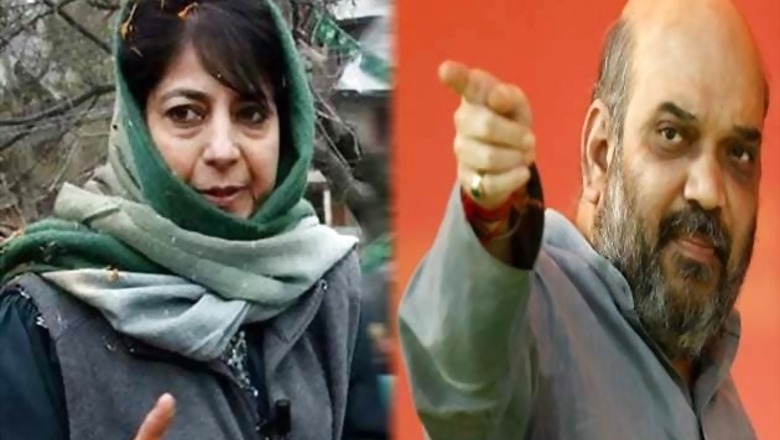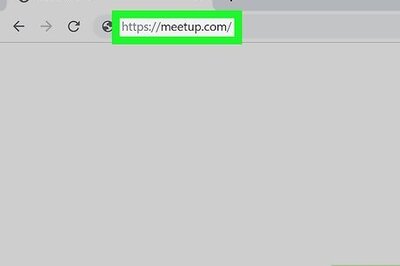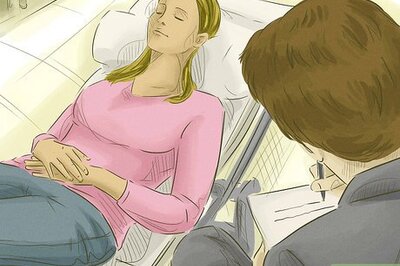
views
Srinagar: Jammu and Kashmir's four-cornered contest resulted in a badly fractured mandate with no party reaching within striking distance of the halfway mark of 44 in the 87-member Assembly. Even though Peoples Democratic Party (PDP) emerged as the single largest party with 28 seats, the Mufti Mohammad Sayeed-led party will not be able to form the government on its own in Jammu and Kashmir and will need the support of other groups.
The PDP appears to be in the pole position to form the government in coalition either with Bharatiya Janata Party (BJP) or Congress. The Mufti-led party can easily form a government in an alliance with the BJP, which has emerged as the second largest party with 25 seats, but political experts say that it will not go down well with its supporters in the valley.
While Mufti advocates a soft approach in dealing with separatists and youngsters who have picked up the gun, the BJP is in favour of a hawkish stance. Article 370 is also another bone of contention with the PDP backing it wholeheartedly while the BJP has given statements in the past, including some from union ministers, on starting a debate on its relevance which has not been to the liking of valley residents.
On the other hand, if the PDP decides to go ahead with Congress, which has bagged 12 seats, it will need support from four Independent MLAs to reach the magic figure of 44.
However, keeping her cards close to her chest, PDP President Mehbooba Mufti said her party will take time to find out what are the formulations which can give good governance. "The priority is not to cobble up any government. We will explore the possibilities. The government should have credibility. It should be able to deliver," she added while addressing a press conference in Srinagar.
Interestingly, senior PDP leader Muzaffar Hussain Beigh gave mixed signals when he said it will be easier for his party to form a coalition government with Congress than BJP. But, he also added that BJP cannot be treated as 'untouchable'.
Despite the fact that the BJP has more than doubled its 2008 tally of 11 seats in Jammu region riding on the Narendra Modi-wave, the saffron party couldn't make inroads into the Kashmir valley and also failed to open an account in Ladakh region where the party candidate Thupstan Chhewang won the Lok Sabha elections a few months ago. Its "Mission 44" failed to cut much ice in the valley with none of its candidates coming close to victory despite Modi's rallies.
But the party is not in a mood to let go of a change at government formation. BJP President Amit Shah made it clear that his party has kept all its options open. "We have a gain of 14 seats in J&K and BJP has got highest vote share. The BJP is open to the three options of supporting a party, receiving support from a party or be a part of a government in Jammu and Kashmir. The decision about government formation will be taken in the party's Parliamentary Board meeting on Wednesday," said Shah.
BJP can form a coalition with Omar Abdullah-led National Conference, which against all odds managed to win 15 seats. But this formation will still need support of four more MLAs to cross the halfway mark. BJP can seek also support from Sajjad Gani Lone-led People's Conference, which has won two seats, and from its former party leader Pawan Gupta, who has won the Udhampur seat as an Independent.
According to BJP sources, the party wants to form an alliance with the NC so that it can be a dominant partner in the coalition government which will not be possible if the saffron party decides to go with PDP. But such a move is unlikely to go down well in the Kashmir Valley as the BJP failed to open its account.
Surprisingly Congress won four seats out of eight seats, which BJP was eying on in Kashmir valley and Ladakh region. The party won three out of four seats in Ladakh region while it bagged Sopore seat, which is the hometown of hardliner Hurriyat Conference leader Syed Ali Shah Geelani. The Congress party which was seen as a distant four by most of the exit-polls, managed to win 12 seats, against 17 seats it bagged in 2008, giving a second option to the PDP.
Even though NC performed better even after the massive anti-incumbency and anger against its government, the Omar-led party failed to retain 13 seats it won in 2008.
NC lost five out of eight seats in Srinagar district, which was considered to be its political bastion dealing a massive blow to the Abdullahs. PDP wrested five out of eight seats in the district while NC managed to retain three seats.
The most prominent NC leaders, who lost in Srinagar district, include Chief Minister Omar Abdullah from Sonawar. Omar lost to his nearest rival and PDP candidate Mohammad Ashraf Mir by a margin of 4,783 votes. The NC working president managed to win Beerwah seat in central Kashmir district of Budgam by a margin of 910 votes.
The Mufti-led PDP, which failed to win any seat in 2008 elections in the district, bagged Amira Kadal, Hazratbal, Zadibal, Sonawar and Batmaloo while NC managed to retain Idgah, Khanyar and Habba Kadal seats.
A high voter turnout in eight constituencies of Srinagar district, which witnessed an increase of around seven per cent against 2008, proved beneficial for the PDP. Srinagar district witnessed 28 per cent voter turnout against 21.93 per cent in 2008.
On the other hand, BJP, which was banking on migrant Pandit votes to win three out of eight seats in Srinagar districts, failed to make inroads into Kashmir valley. Out of seven seats it contested, BJP managed to secure just 9904 votes. The party's candidate Masoodul Hassan in Hazratbal seat secured the highest 2635 votes while Neelam Gaash in Zadibal seat managed only 360 votes.















Comments
0 comment